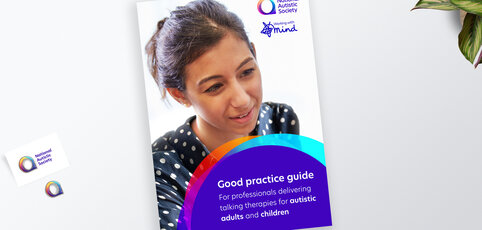Please be aware that the National Autistic Society does not offer a crisis or emergency service. UK residents can access urgent help or support by contacting the services listed on our urgent help page.
If you are struggling and feel that you might need some support with your mental health, it is important to try and get the right help. You may want to start by speaking to family, friends or carers you trust about the difficulties you are experiencing.
You can approach your GP for advice and a referral to mental health support and services. The Mind website has useful guidance on approaching your GP and how to prepare for the appointment. There’s also a PDF guide you can download.
You might want to ask your GP or other health professionals to make some basic adaptations to make your appointment more comfortable, such as:
- being able to book appointments online or via email
- information on what to expect from the service
- having a friend, relative or carer attend appointments with you
- adapting communication to avoid confusion, such as allowing more processing time to answer questions or using written information/questions
- changes in the room where you have appointments - for instance, to dim the lights to reduce sensory input.
There are different types of community and mental health services that your GP might refer you to. These will vary across the UK but may include:
- community mental health teams (CMHTs) - multi-disciplinary mental health support teams for adults living in the community
- social care - social care is any care or support you need to carry out day-to-day tasks which you're finding difficult
- crisis intervention - a crisis resolution and home treatment team (CRHT) can support you through a crisis at home
- hospital treatment - either voluntary inpatient treatment or hospitalisation under the Mental Health Act
- Child and Adolescent Mental Health Services (CAMHS), an NHS-funded nationwide service focused on young people’s mental wellbeing.
Mind provides specific information and advice about mental health services including the above.
Therapy or counselling
Your GP may also refer you for therapy or counselling or you may find a private therapist local to you who offers one-to-one support. Before you begin any therapy, ask the therapist if they have experience of working with autistic people so that you know they are likely to adapt the way they work to meet your needs.
You can use our Autism Services Directory to find counsellors in your area. Mind also has information about finding a therapist or you can search on the British Association for Counselling and Psychotherapy’s website.
If you live in England, you can use an NHS service called Improving Access to Psychological Therapies (IAPT), which offers talking therapies for mental health problems. You can often refer yourself without going through your GP. Find IAPT services on the NHS website.
You might want to contact a mental health advocate if you are struggling to get the help you feel you need. Mind has further information on mental health advocates and your rights.
Medication
You may be prescribed psychotropic medication to treat your mental health condition. Psychotropic medication is a term for medications that can change your behaviour, mood, thoughts or perception. There are many reasons why you might be prescribed psychotropic medication, including to treat psychosis, depression and anxiety. It is important that they are prescribed appropriately and regularly reviewed.
STOMP is a national project that aims to promote everyone working together to support the safe and appropriate use of psychotropic medications and reduce overprescribing. STOMP stands for stopping over medication of people with a learning disability, autism or both with psychotropic medicines.
Working with the NHS, we have produced a guidebook for autistic adults who are prescribed psychotropic medication. It gives you more information about why the medication might be prescribed, possible side-effects, medication reviews and information on monitoring your own health and wellbeing. It also includes a workbook that you can use to help prepare for a medication review.
You can download a free copy of Stopping The Over-Medication of People (STOMP): a resource for autistic people and their families from our online shop.
Helplines and listening support services
Mind Infoline: 0300 1233393 for information and signposting (9am to 6pm, Monday to Friday)
SANEline: 0300 304 7000 for anyone experiencing a mental health problem or supporting someone else (4.30pm to 10.30pm, every day)
Samaritans: 116 123 or email jo@samaritans.org (24 hours a day)
Campaign Against Living Miserably (CALM) – for men 0800 58 58 58, (5pm to midnight every day).







